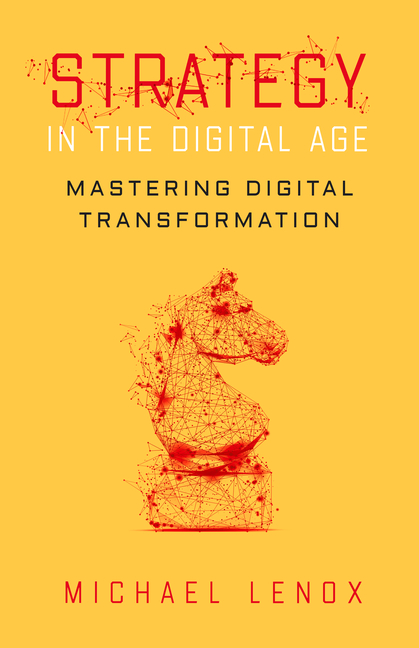An Excerpt from Strategy in the Digital Age
 Digital transformation is much more than building a digital infrastructure to gather and process data. It is about understanding how digital technologies enable the creation of innovative services and products. It is about identifying new competitive positions and business models and thinking critically about how to both create and capture value. Strategy in the Digital Age directly engages these concerns and provides a comprehensive roadmap for planning a successful digital strategy and executing a digital transformation in organizations.
Digital transformation is much more than building a digital infrastructure to gather and process data. It is about understanding how digital technologies enable the creation of innovative services and products. It is about identifying new competitive positions and business models and thinking critically about how to both create and capture value. Strategy in the Digital Age directly engages these concerns and provides a comprehensive roadmap for planning a successful digital strategy and executing a digital transformation in organizations.
Covering major topics such as big tech, data analytics, artificial intelligence, blockchain, cryptocurrency, autonomy, cybersecurity, data privacy, and antitrust, strategy expert Michael Lenox outlines a set of novel, original frameworks to help those undertaking digital transformation at their organization devise their strategy. Readers will also come away with a greater understanding of how to navigate the human dimension of digital transformation and tackle the numerous social and policy challenges raised by digital technology.
Speaking to that final concern, the excerpt below is from the Chapter Six: "Policy in the Digital Age."
◊◊◊◊◊
THE VALUE OF VALUES
Your values as an individual and organization ultimately guide what actions you feel are appropriate. This is the reason that we place values at the top of the Strategist’s Challenge. They are your north star. Your guiding light. They determine which competitive positions you feel comfortable pursuing and which you do not. Which competitive actions to take and which to avoid. While your strategy may constantly adjust to meet evolving market needs, your values should be eternal. If your values do not align with a given market opportunity, maybe it is time to look for a new segment in which to compete.
Too often, managers fall back on bromides such as “doing [whatever] maximizes shareholder value.” To be clear, maximizing shareholder value is not a legal restriction about what is required of you as a manager. Managers are required to be fiduciaries to their shareholders. Technically that means they are required to be trustworthy and transparent in their actions. Yes, shareholders can direct their capital elsewhere or even remove leaders with whom they disagree, but that does not permit the manager to avoid value-based decisions. Even reasonable guidance such as “maximize profits while not engaging in illegal activities” gets murky when a company can actively influence and shape the legal environment it operates in through lobbying and other forms of persuasion.
Thus the pursuit of profit does not absolve the manager of making moral decisions about what activities are consistent with their values and which are not. Many well-intentioned managers have found themselves going down the slippery slope of moral relativism: “Our customers love our new service based on their personal data, I know it is a little unseemly, but what if we grabbed a little more personal data so we can improve the service even more!” Just because you can leverage data to provide a new product or service, does not mean you should.
The digital age presents many moral challenges to leaders. What data is acceptable to collect and to what ends should it be applied? How much uncertainty, and potential bias, are we willing to accept in our predictive algorithms? How much autonomy do we want to concede to machines? Do we concern ourselves with the loss of jobs in our organization due to the automation of workflows? How much responsibility do we assume for users of our platforms? Do we view certain users as partners, employees, or independent contractors? What are our responsibilities to each? How do we wish to play in the “nonmarket” arena? Do we feel that all actions are fair game? Or are there limits to what we are willing to do to gain an edge or to win a stakeholder battle?
With regard to this last point, leaders need to recognize that your nonmarket strategy is part and parcel of your overall strategy. You cannot separate the two. With a group of colleagues, I contributed to a paper titled “CSR Needs CPR”—in other words, corporate social responsibility needs corporate political responsibility. Beyond the clever title, the point was that companies that espouse a set of values on their company website and then engage in political behavior counter to those espoused values risk subjecting themselves to charges of hypocrisy. Even worse, as individuals and organizations, they demonstrate a lack of integrity—either a failure to live their espoused values or a failure to espouse their true values. It is beyond my role to tell you what your values should be, but recognize that your values matter. True leaders are authentic in their espoused values and work to build organizations and cultures that are aligned with them.
Excerpted from Strategy in the Digital Age: Mastering Digital Transformation.
Copyright © 2023 by Michael Lenox.
Reprinted with permission from Stanford Business Books.
All rights reserved.



